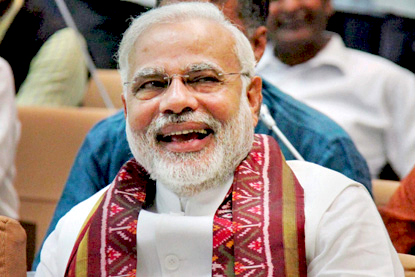Vadodara, Oct 23: Using the analogy of surgical strikes, Prime Minister Narendra Modi on Saturday wondered what would have happened if the government had adopted similar strategy in the recent campaign against blackmoney, which unearthed Rs 65,000 crores.
 "We gave some time to those who had generated black money (to declare it). You will be happy to know that Rs 65,000 crore in black money came into mainstream with payment of tax and penalty.
"We gave some time to those who had generated black money (to declare it). You will be happy to know that Rs 65,000 crore in black money came into mainstream with payment of tax and penalty.
"Now think, Rs 36,000 crore that was leaking has been stopped (by direct benefit transfer), and Rs 65,000 crore of black money is unearthed, together it is Rs one lakh crore.
"And this Rs one lakh crore has been brought back without launching surgical strikes," Modi said, invoking the term used for recent operation by Army against terror launch pads in Pakistan-occupied-Kashmir.
"If we do surgical strikes (in this area), you can imagine what all will come out," the Prime Minister said.
Modi said he has put up a sustained fight against corruption since he took charge.
"Against corruption, without much publicity I have put up a sustained fight. Government's assistance (now) goes directly in the bank accounts of beneficiaries, cutting out middlemen.
"Just by ensuring that right person gets the benefit and wrong person cannot take it, we have saved Rs 36,000 crore, which used to leak in the form of (subsidies for) gas cylinders, scholarship, pension," Modi said.
Modi, speaking at a camp to distribute 'assistive devices' to over 8,000 `Divyangs' (disabled persons) here, also criticised past governments for not doing enough for the disabled.
After distributing aid devices to the disabled, the Prime
Minister said, "Knowingly or unknowingly, this country has remained insensitive towards the Divyangs.
"The government buildings only had facility for healthy persons. We launched Sugamya Bharat mission, so that government buildings, hospitals, platforms are built in such a way that they have access facility for the Divyangs."
Previous governments did not do enough in this field, he said.
"Governments in the past had also worked in this direction. But you will be shocked to know that since 1992, when work started in this direction, till 2014, only 56 such camps (for distributing assistive devices) for Divyangs were organised. After this government came, 4,500 such programmes were held," Modi said.
"So far, 5.50 lakh Divyangs from across the country have been provided direct benefit.
"In the central government, I came to know that 16,500 posts for Divyangs were vacant. I told my Ministers to fill up these vacant posts. I can say with satisfaction that 14,500 such posts have been filled up," Modi said.
The Prime Minister also said his government had started work for having `common sign language', as at present different sign languages are used in different parts of the country.
Referring to the country's economic growth, he said India was a bright spot in the world.
"Today in the entire world, one thing about this country is being praised. The world says that India is the fastest growing economy in the world. Be it World Bank, IMF or credit-rating agencies, the entire world says in one voice that India is developing very fast.
"Solution to all problems lies in development. Only through development can illiteracy, disease, poverty be removed," Modi said.
"Remember the days of 2014, or 2013, what were the headlines? They did this much (corruption) in coal, so much in spectrum. Since the time you gave me the responsibility, in two and a half years the news is (about) doing good for Divyangs, India's progress in world economy and development," Modi said.






Comments
Gareebi Lavo, India Ko Dubavo is the hidden slogan of this PM
Add new comment